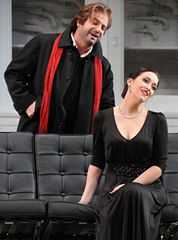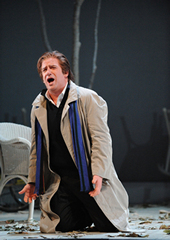| Melbourne Opera presents La Traviata by Giuseppe Verdi Directed by Hugh Halliday Venue: Athenaeum Theatre Written by Olympia Bowman-Derrick |
| Saturday, 28 March 2009 02:53 |
 La Traviata is Giuseppe Verdi’s tragic romantic masterpiece. Violetta Valery (Kerry Gill), a Parisian courtesan, and Alfredo Germont (Roy Best), her secret admirer, are star-crossed lovers. Like Romeo and Juliet, their tragedy is their circumstance, their society and its conventions. La Traviata is Giuseppe Verdi’s tragic romantic masterpiece. Violetta Valery (Kerry Gill), a Parisian courtesan, and Alfredo Germont (Roy Best), her secret admirer, are star-crossed lovers. Like Romeo and Juliet, their tragedy is their circumstance, their society and its conventions.Melbourne Opera opens their 2009 season with a new production of the first opera produced by the company six years ago. Under South East Regional Touring Opera, Melbourne Opera continues to provide affordable professional opera performances to metropolitan and south east regions, and greater employment opportunities for local artists. In the quaint, yet acoustically-challenged Athenaeum theatre, Hugh Halliday’s slightly antiquated production sat perfectly. Andrew Bellchambers attractive set design framed (quite literally) the action – outstretched longing hands reaching over a bed of Camellias. The fiery passion that infuses Verdi’s musical score demands great emotional engagement and expression – however, in this production, the need to perform to the front, for reasons of projection, seemed to take priority. Much of the dramatic passion was lost. It is very difficult, perhaps impossible, to portray the joy of love when you are not looking at the person you’re supposed to be in love with. Gill and Best lacked chemistry. Gill, who stepped in for the indisposed Amanda Wang, performed commendably. Her voice has a velvety sweetness that caressed Verdi’s legato phrases beautifully. However, the role of Violetta demands both dramatic and lyric potential to express the joyous outbursts of love and the tender breaking of a heart. Gill offered an exquisite lyrical pianissimo, but did not contrast this with the dramatic fortissimo needed to capture the vitality of spirit of Violetta, and of Verdi’s music. Gill’s portrayal was not helped by Sue Halls’ unflattering costume design and Christina Pallikaris’ hair and makeup. In a bustled, lacy Victorian gown, with a tight feathered bun, Violetta seemed more of the Marx Brothers’ Margaret Dumont matron than the coquettish vibrant flower. Only in the final act, as Violetta is dying from consumption, did the spirit of Verdi’s Violetta seem to emerge. In a simple slip, Gill’s soft frailty of expression captured the audience. Once described as, La *cough-cough* Traviata, this is an opera which despite its incredible subtlety and beauty, can quite easily slide into the melodrama and histrionics of a period costume drama. And yes, Hugh Halliday’s production included stiffly rehearsed unison chorus bursts of laughter, Victorian inspired costumes, and a little touch of Gilbert and Sullivan. But all of this simply added to the curious charm of the production – despite its failings, the audience was captivated by the vividness of Verdi’s music. Photos - Robin Halls: Kerry Gill as Violetta and Roy Best as Alfredo. |
Saturday, March 28, 2009
Traviata, Melbourne Opera, Mar 28, 2009
Monday, March 23, 2009
Werther - SOH - 23 March 2009
| This well executed revival of Werther displays an admirable lightness of touch by Sarah Noble | |
| Massenet: Werther Opera Australia Sydney Opera House March 2009 | |
| Novel and opera recount the same basic story of the poet Werther's ill-fated love for the married Charlotte, a devotion which ultimately results in his suicide. Massenet's most significant departure from Goethe is in the nature of Charlotte's own feelings. Goethe's Lotte has great affection for Werther, but she does not return his love and has no intention of leaving her husband. Massenet's Charlotte is a romantic heroine in her own right, with the solo scenes and arias to match. She returns Werther's love completely, despite attempts to deny it, but remains bound by her mother's dying wish (another of the opera's inventions) to marry Albert. Goethe's Werther shoots himself and dies alone; Massenet's succumbs in the arms of a stricken Charlotte, who has finally confessed her feelings to him. Elijah Moshinsky's production of Werther for Opera Australia premiered in 1989. It's a slick modernisation, kept genuinely current by Moshinsky's stipulation that new costumes be sourced from contemporary designers (in this case Leona Edmiston and Farage) for every revival. There's no escaping the opera's Romantic-era melodrama, but Moshinsky's update offers an intriguing examination of the social politics at work in Werther without crushing its sentimental excesses. Michael Yeargan's spare, elegant sets and Robert Bryan's dramatic lighting design (realised by Simon Lefort) lend the production a cinematic quality: a hyperrealism which indulges occasional histrionics without veering into farce. Elke Neidhardt directs this revival with perceptive vision and admirable lightness of touch, finding room for the opera's sometimes laughable melodrama within a sincere depiction of its tragedy. | |
|
Stephen Bennett is warm and benevolent as Le Bailli, his sturdy bass and sterling French diction making much of the character's relatively brief appearances; he's trailed by a host of talented children as his Von Trappish brood. Stephen Smith and David Thelander bring welcome local colour to the piece as drinking buddies Schmidt and Johann, while Andrew Brunsdon and Jodie McGuren are suitably comical in their cameos as a pair of ersatz Beatniks, part of Albert's entourage of Beautiful People. The children's chorus sings with purity and intelligible French in their vital final appearance: a merry offstage Christmas carol cruelly juxtaposed with Werther's painful death. Conductor Emmanuel Plasson puts a winningly French stamp upon the work, carefully blending sincerity and syrup to give Massenet's rich, emotionally vivid score plenty of space to breathe and blossom. Werther will probably always have to give way to Manon as Australia's favourite Massenet opera but thanks to Moshinsky, Neidhardt and Plasson, this enjoyable and touching production is a happy reminder of why it shouldn't be entirely ignored. | |
| Text © Sarah Noble Photos © Branco Gaica |
 Jules Massenet's Werther is a curious European hybrid: a very French treatment of a very German story. Published in 1774, Johann Wolfgang von Goethe's novel Werther made a celebrity of its author and an icon of its melancholy protagonist. Approaching the subject over a century later, Massenet and his librettists instead took every liberty necessary to adapt the novel to their own, very different idiom: plot points were manipulated, motives altered, and characters developed, expanded or simply invented. Massenet's Werther is a very different creature from Goethe's, with an artistic life all its own.
Jules Massenet's Werther is a curious European hybrid: a very French treatment of a very German story. Published in 1774, Johann Wolfgang von Goethe's novel Werther made a celebrity of its author and an icon of its melancholy protagonist. Approaching the subject over a century later, Massenet and his librettists instead took every liberty necessary to adapt the novel to their own, very different idiom: plot points were manipulated, motives altered, and characters developed, expanded or simply invented. Massenet's Werther is a very different creature from Goethe's, with an artistic life all its own.  Australian tenor Aldo Di Toro's refined, expressive artistry is sensational in the title role. His honey-voiced Werther is a sensitively realised creation, his radiant pianissimi as moving as the ardent heights of his "Pourquoi me réveiller". Michèle Losier is a dignified Charlotte, her dark, full-bodied mezzo especially powerful in Charlotte's third act monologue and aria ("Qui m'aurait dit la place...Va! Laisse couler mes larmes"). Baritone Andrew Schroeder brings vocal authority to the role of Albert, Charlotte's husband, although he's hampered by a one-dimensionally stuffy conception of his character. Sarah Crane's sunny soprano is well suited to Sophie, Charlotte's relentlessly cheerful younger sister, a potentially irritating character made more than bearable by Crane's delightful presence.
Australian tenor Aldo Di Toro's refined, expressive artistry is sensational in the title role. His honey-voiced Werther is a sensitively realised creation, his radiant pianissimi as moving as the ardent heights of his "Pourquoi me réveiller". Michèle Losier is a dignified Charlotte, her dark, full-bodied mezzo especially powerful in Charlotte's third act monologue and aria ("Qui m'aurait dit la place...Va! Laisse couler mes larmes"). Baritone Andrew Schroeder brings vocal authority to the role of Albert, Charlotte's husband, although he's hampered by a one-dimensionally stuffy conception of his character. Sarah Crane's sunny soprano is well suited to Sophie, Charlotte's relentlessly cheerful younger sister, a potentially irritating character made more than bearable by Crane's delightful presence.